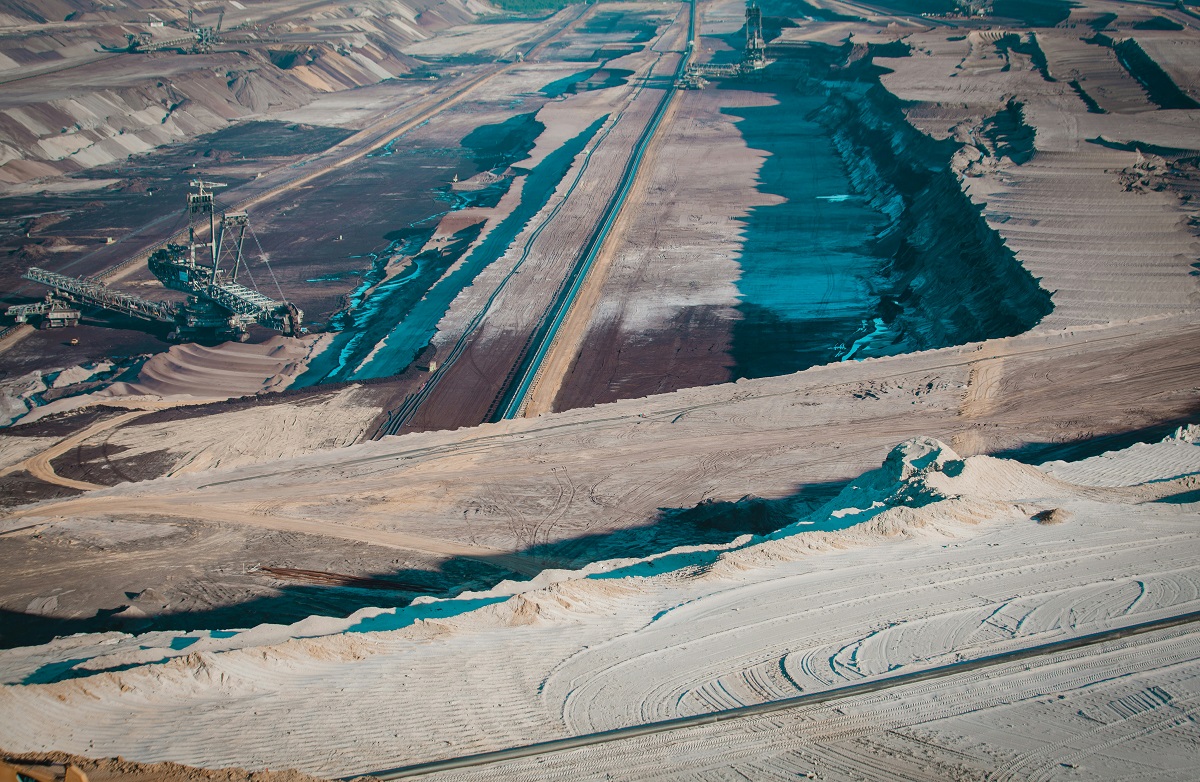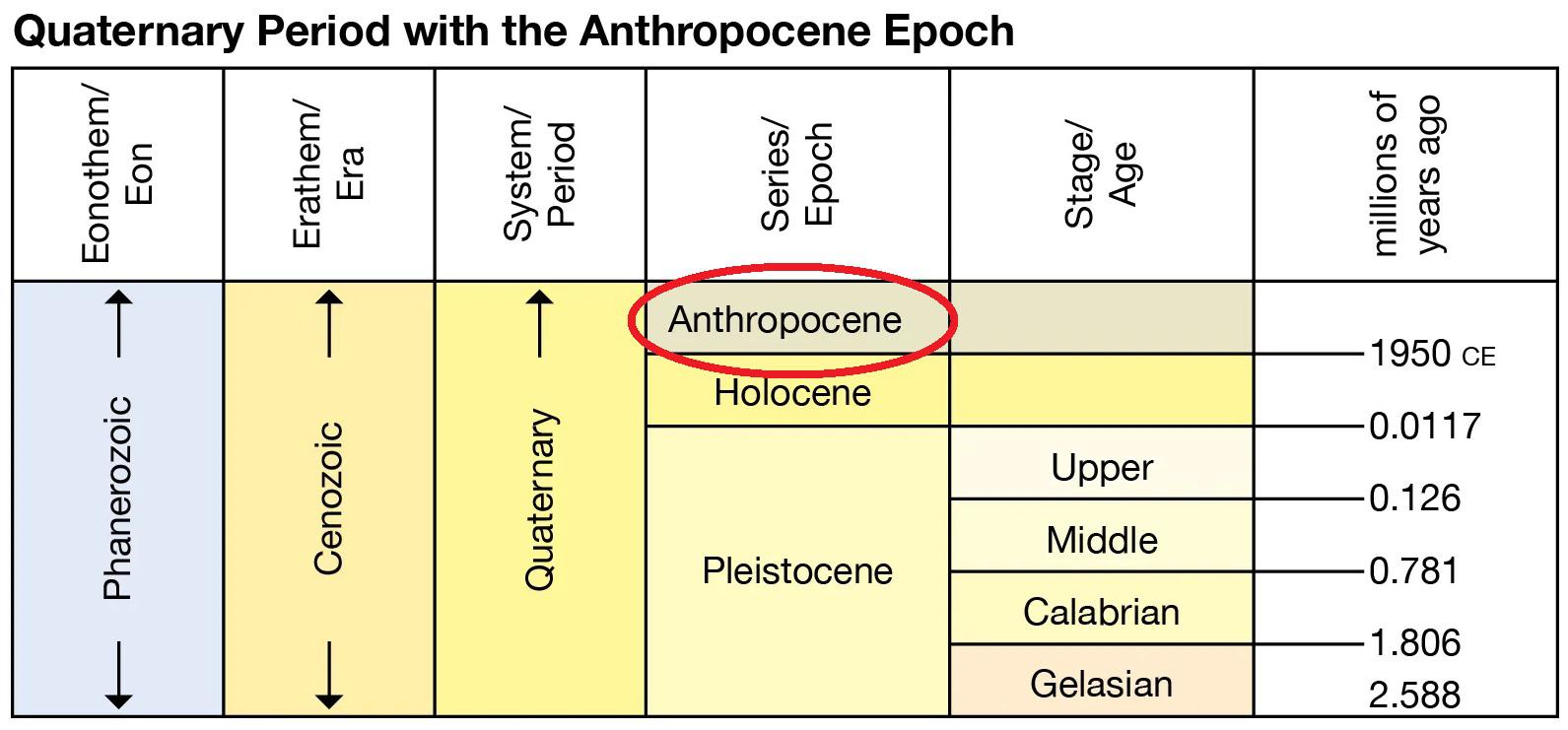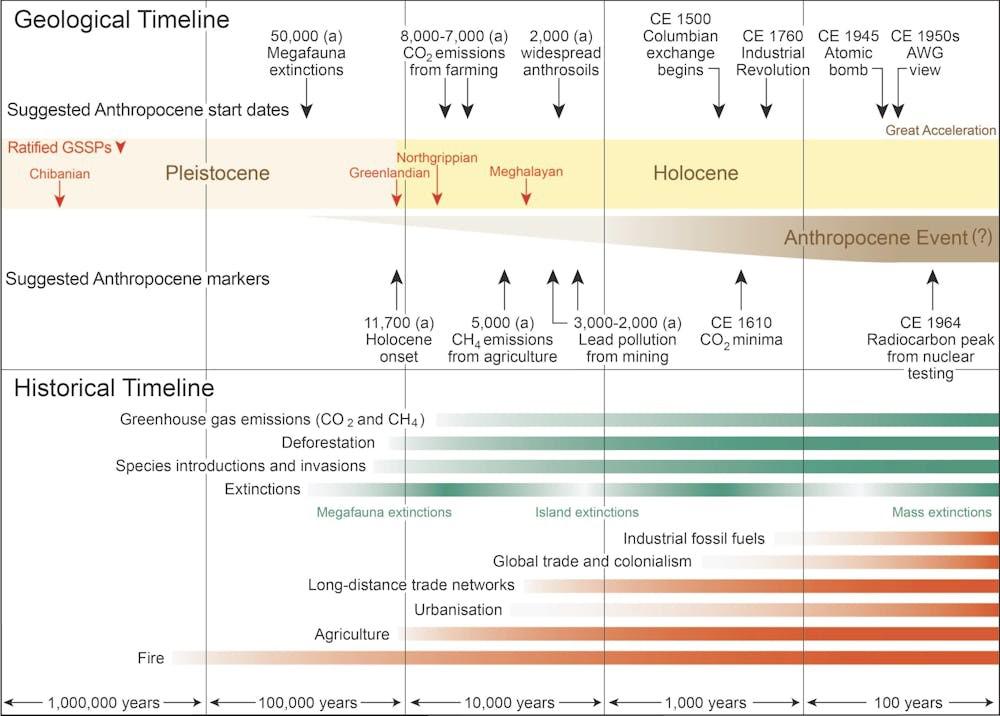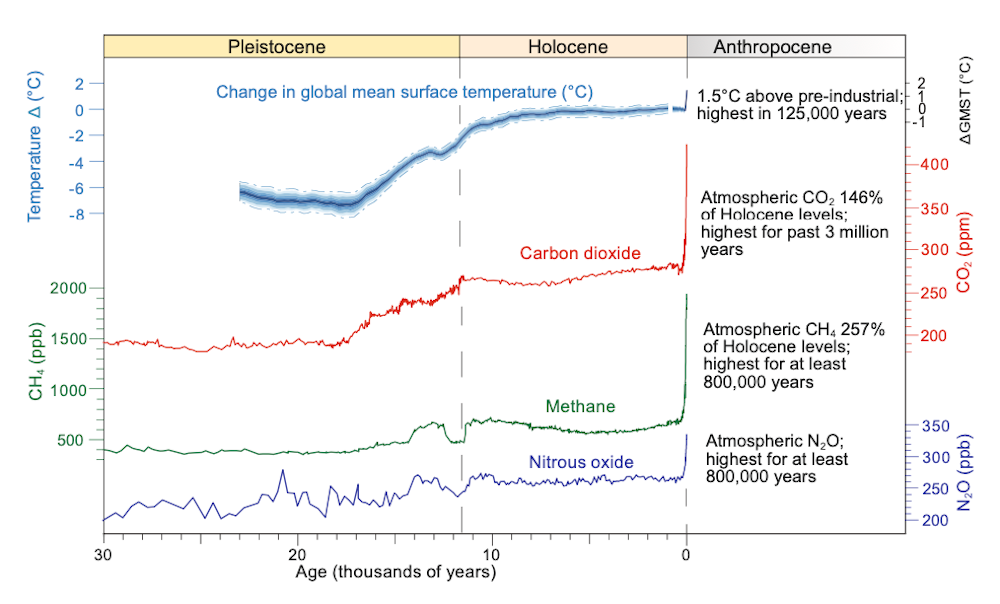Anthropocene rejected and what it means from an epistemological perspective
Anthropocene rejected and what it means from an epistemological perspective
Author: José Luis Granados Mateo is Postdoctoral Researcher in the Department of History and Philosophy of Science at the University of Cambridge.

The geologists of the International Commission on Stratigraphy’s Subcommission on Quaternary Stratigraphy (SQS) made a substantial decision on March 4, 2024 1, by rejecting the proposal to formally acknowledge the beginning of the Anthropocene—a new geological epoch attributing humanity’s emergence as the primary force shaping the Earth’s strata. This proposal, led by the Anthropocene Working Group (AWG), has been in development since 2009; facing nearly 15 years of scrutiny and debate within the stratigraphic community and beyond.

Central to the proposal was the identification of a precise starting point. Geologists within the subcommission were tasked with voting on the AWG’s proposal to establish a stratigraphic boundary in the mid-20th century 2. This boundary was based on a notable spike in plutonium traces found in the sediments of a remarkably undisturbed lake in Canada, aligning with various other indicators of human activity. These radioactive elements spread globally following various thermonuclear bomb tests undertaken in the early 1950s.
The entire process was fraught with controversy, with two AWG members—Chairman Jan Zalasiewicz and Vice-Chairman Martin Head—declining to vote. In abstaining, they cited ethical concerns, prompting scrutiny from the corresponding geoethics committee. Ultimately, twelve out of eighteen subcommission members voted against the proposal.
What accounts for this opposition? Proponents of the Anthropocene Epoch faced resistance from some geologists accustomed to working with geological timescales spanning millions of years. The notion of condensing an epoch into merely seven decades—barely a human lifetime—proved challenging to accept. Additional concerns already were raised by Professor Stanley C. Finney, Secretary-General of the International Union of Geological Sciences, who feared the proposal to be more political in nature, rather than scientific 3. Despite these challenges, the AWG remains steadfast in their assertion that the evidence supports the reality of the Anthropocene Epoch.
Some critics of regarding the Anthropocene as a chronostratigraphic unit concur that the definition offered by the AWG is too limited and superficial in scope to adequately represent human impact on the planet and to then equate it with a major epochal change in the Earth’s history 4. Therefore, some have suggested an alternative approach in understanding the Anthropocene not in chronostratigraphic or geochronological terms (series/epoch), but instead as an ongoing ‘anthropogenic event’ 5, analogous to biotically driven events in deep geological time that have also had far-reaching impacts on global environmental systems.
The Anthropocene as an Event, not an Epoch
For these scholars, the stratigraphic record unequivocally indicates that measurable human impacts on the Earth’s system date back several millennia within the Holocene epoch across numerous global regions, and conceivably even earlier in certain areas. Furthermore, they contend that a range of proxy records delineates the conspicuously diachronic nature of human impact when scrutinised through historical or anthropogenic temporal scales. They argue that anthropogenic-environmental transformations, influencing global processes, commenced at disparate locations and with varied commencement times, subsequently spreading geographically at heterogeneous rates, as depicted in the ensuing figure:

They note that this phenomenon occurs irrespective of whether it involves changes in ecosystems and the mass extinction of large vertebrates at the end of the last glacial period; the advent of early agriculture, which influenced the atmospheric load of trace gases; long-term patterns of tropical deforestation impacting precipitation, temperature, soil stability, and the carbon cycle; land clearance in the Americas; the scope and ramifications of significant changes in European biomes; global-scale industrial development entailing the alteration of watercourses; or the extraction of fossil fuels for energy.
For these reasons, this collective posits that, unlike a series/epoch, defining a ‘geological event’ presents a more practical and convenient solution. It liberates the concept from the constraints of geological formalisation—such as the necessity of establishing a globally synchronous start around 1950 with a ‘golden spike’—as well as from its alignment with established chronostratigraphic and geochronological units within the Holocene Series/Epoch. Additionally, it provides a universally applicable term that facilitates communication beyond the discipline of geological sciences alone, also encompassing the social sciences and humanities. Thus, the Anthropocene would be acknowledged as a significant transformative episode in Earth’s history, akin to similar-scale events in the geological record.
The Anthropocene really should be a new geological epoch
However, proponents of the Anthropocene argue that labelling it as a mere ‘geological event’ overlooks a crucial aspect 6. They point to its initial proposition by Paul Crutzen—a Nobel Prize laureate in chemistry—made sporadically during a scientific gathering in 2000 7. While not a geologist himself, Crutzen, drawing on insights from contemporary Earth System Science, highlighted a significant departure in the Earth’s system—encompassing critical factors like atmospheric composition, climate, and ecosystems—from the stability observed over millennia during the Holocene epoch. This sustained stability had facilitated the growth and prosperity of human civilization, and Crutzen deemed it illogical to confine the present epoch within the boundaries of the Holocene.
For the AWG, there is now no doubt regarding this pivotal shift, nor whether it has left sufficient imprints in recent geological layers to warrant the description of the Anthropocene as a geological time unit—as such a unit must be discernible in rock layers millions of years into the future, rather than merely perceived as a shift in conditions 8. However, how can the difference between Crutzen’s concept and that of an ‘Anthropocene event’ spanning 50,000 years or more be elucidated?
The crucial aspect lies within Figure 3, where various events are delineated along the X-axis, but there is an absence of a corresponding Y-axis, which would indicate the magnitude of the impacts. Consequently, they have introduced the following graph to rectify this omission:

This graph depicts the past 30,000 years, encompassing the entirety of the Holocene and providing, for them, a clearer depiction of how things relate over time. With a single glance, it quickly becomes apparent that the recent speed and magnitude of change stand out prominently. They argue that the abrupt rises essentially represent Crutzen’s Anthropocene, spanning the last 72 years of what has been denoted the ‘Great Acceleration’ of population, industrialization, consumption, globalisation, and technological innovation 9.
Comparable visuals can be generated to illustrate the rates of extinction and species invasion, as well as the generation and dissemination of plastics, fly ash, and various other components. For them, these serve to further illustrate that Crutzen’s Anthropocene is not only evidence-based, but ‘real’, and represents an epoch-scale change—at the very least. From their perspective, it is important to understand that the recent near-vertical trends in these graphs remain predominantly on the rise, leading us to a new kind of planet. The repercussions of which are sure to last for many thousands of years to come, with some set to change the Earth forever.
Different values yield different outcomes?
So the Anthropocene as an epoch is very different from the Anthropocene as an event. In reality, both might be valid and perhaps even complementary, but some argue that these should be mutually exclusive. Which is of greater import: the human impact on the planet being diachronic and spanning several years? If so, the Anthropocene is an event. Or the fact that from the mid-20th century onward, the impact becomes disruptively greater? If so, then the Anthropocene is an epoch.
At present, we know that opposition to the Anthropocene as an epoch has clinched the debate through securing the majority of votes within the subcommission. However, the conclusion to the narrative is far from finished. Indeed, Jan Zalasiewicz and Martin Head had submitted a report contending that the vote was fraudulent, a matter that has been under investigation by the Geoethics Commission of the International Union of Geological Sciences 10 —despite this, a statement made on 20 March terminated the assessment, affirming that the voting process was conducted fully in accordance with the statutory requirements 11. Zalasiewicz had requested the report be disseminated to subcommission members prior to any voting, yet this plea was disregarded, and the voting pressed on, with members notifying the New York Times of the outcome before its public release.
The report submitted by Zalasiewicz and Head included that the AWG, in formulating its proposal, had been unjustly treated, encountering conflicts of interest, differential application of standards compared to other working groups, as well as unreasonable requests and restrictions. Moreover, an insufficient amount of time had been allocated for commentary on the proposal, and the AWG had not been solicited for feedback on the discussions, contrary to customary practice. Historian of climate science Naomi Oreskes, one of its members, observes:
“The irregularities in the SQS voting procedures strongly suggest that the SQS did not make its decision on scientific grounds. The argument put forward by the AWG—and overwhelmingly endorsed by the AWG membership—was never given a fair hearing. What’s particularly sad about this to me—as a person who cut my teeth in field geology—is that by rejecting the Anthropocene proposal, the SQS suggests to the world that they are unwilling or unable to recognize what we all can now see: that we do indeed live in the Anthropocene. By denying the obvious, the stratigraphers threaten to undermine the credibility of the science that they claim to be protecting.”
From an epistemological standpoint, this dilemma is of great interest. A common belief often shared by scientists is that objectivity is—or should be—an unquestionable aspect of facts, regardless of who interprets the evidence. For scientific claims, methods, findings, and even scientists themselves to be seen as objective, they should not be swayed by specific perspectives, value judgments, community biases, or personal interests, among other relevant factors. Objectivity is commonly viewed as an ideal in scientific inquiry, a compelling reason to value scientific knowledge, and could even be considered the bedrock of science’s authority in society 12.
However, from the perspective of the philosophy of science, it has been widely acknowledged that science is never devoid of values 13. Present in every induction based on empirical data, there invariably exists a degree of inductive risk: an inherent uncertainty in extrapolating from specific observations to general conclusions 14. This implies that an inductive inference—such as inferring a significant and isochronic change in strata—cannot guarantee the truth of its conclusions, as they always rely on a finite and selective set of observations rather than logical deduction. This is the juncture where value judgments are pertinent in determining whether to embrace or discard a hypothesis.
Let us consider a practical case. Suppose a study is conducted concerning the environmental ramifications of natural resource extraction, such as fracking, in a region prone to seismic activity. Scientists amass geological data alongside seismic event records to ascertain the potential correlation between fracking activities and heightened seismic occurrences within the locale. From an epistemic vantage point, scientists are duty-bound to rigorously employ scientific methodologies to collate and analyse data, striving to mitigate biases and uphold the integrity of their findings. Nevertheless, notwithstanding these endeavours, there remains an inherent lack of absolute certainty in the conclusions drawn, given the inherently always limited nature of the dataset—a residual risk persists.
Of course, there are instances where this risk is exceedingly low—such as the prediction that the sun will rise tomorrow—yet there are others where social values may influence how available data is interpreted and communicated. Let us suppose that in the aforementioned region, there exists a significant economic reliance on the oil and gas industry, engendering political and economic pressures to advocate for fracking as a safe and lucrative endeavour. This circumstance could precipitate a bias towards interpreting data in a manner that downplays the link between fracking and earthquakes, as scientists may find themselves swayed by these external values. Or, given the social ramifications, it may necessitate a greater quantity or quality of evidence to warrant the risk of induction. Each of these cases represents how social values might influence, at least indirectly, the validation of scientific knowledge (Douglas 2009, Elliott & Richards 2017).
What is happening with the Anthropocene? The question remains unanswered. It is acknowledged that evidence extracted from Lake Crawford, as assessed by the AWG, aligns with the usual criteria for formalising an epoch. However, amidst the numerous criticisms, the significant social consequences of both its acceptance and rejection are evident. Embracing the Anthropocene, whether as an epoch, event, or another classification, endorses a concept informally employed across various spheres to address humanity’s global environmental challenges. Some members of the AWG advocate that geology should shoulder societal responsibility in this regard 15. Others argue that this represents an improper blending of geology with environmental concerns, as asserted by the President of the Official College of Geologists in Spain 16. Therefore, its acceptance also bears internal social implications within the geological community. Factors such as which research group attains greater visibility—and consequent funding—within society, as well as the prominence attributed to specific geological themes—such as deep time versus recent geological phenomena—and who holds voting membership in relevant decision-making commissions are contingencies that would surprise many in terms of their impact on knowledge throughout the history of science.
Acknowledgements
José Luis Granados Mateo’s research is supported by funding from the Basque Government’s Postdoctoral Research Program.
References
- Witze, A. (2024). Geologists reject the Anthropocene as Earth’s new epoch – after 15 years of debate. Nature, 627, 249-250. https://doi.org/10.1038/d41586-024-00675-8 ↩
- Waters, C. N., Turner, S., An, Z., Barnosky, A., Cearreta, A., Cundy, A., … Zinke, J. (2024). Executive Summary: The Anthropocene Epoch and Crawfordian Age: proposals by the Anthropocene Working Group (pre-print, Open access). Retrieved from https://doi.org/10.31223/X5VH70 ↩
- Finney, S. C., & Edwards, L. E. (2016). The “Anthropocene” epoch: scientific decision or political statement? GSA Today, 26(3), 4–10. ↩
- Walker, M. J. C., Bauer, A. M., Edgeworth, M., Ellis, E. C., Finney, S. C., Gibbard, P. L., & Maslin, M. (2023). The Anthropocene is best understood as an ongoing, intensifying, diachronous event. Boreas, 53, 1-3. https://doi.org/10.1111/bor.12636 ↩
- Gibbard, P. L., Bauer, A. M., Edgeworth, M., Ruddiman, W. F., Gill, J. L., Merritts, D. J., Finney, S. C., Edwards, L. E., Walker, M. J. C., Maslin, M., & Ellis, E. C. (2022). A practical solution: the Anthropocene is a geological event, not a formal epoch. Episodes, 45, 349-357. https://doi.org/10.18814/epiiugs/2021/021029 ↩
- Head, M. J., Zalasiewicz, J. A., Waters, C. N., Turner, S. D., Williams, M., Barnosky, A. D., … Summerhayes, C. P. (2023). The Anthropocene is a prospective epoch/series, not a geological event. Episodes, 46, 229-238. https://doi.org/10.18814/epiiugs/2022/022025 ↩
- Crutzen, P. J., & Stoermer, E. F. (2021). The ‘Anthropocene’ (2000). In S. Benner, G. Lax, P. J. Crutzen, U. Pöschl, J. Lelieveld, & H. G. Brauch (Eds.), Paul J. Crutzen and the Anthropocene: A New Epoch in Earth’s History (Vol. 1, pp. 2). Springer. https://doi.org/10.1007/978-3-030-82202-6_2 ↩
- Zalasiewicz, J., Head, M. J., Waters, C. N., Turner, S. D., Haff, P. K., Summerhayes, C., … Zinke, J. (2024). The Anthropocene within the Geological Time Scale: a response to fundamental questions. Episodes, 47, 65-83. https://doi.org/10.18814/epiiugs/2023/023025 ↩
- Head, M. J., Steffen, W., Fagerlind, D., Waters, C. N., Poirier, C., Syvitski, J., … Zinke, J. (2022). The Great Acceleration is real and provides a quantitative basis for the proposed Anthropocene Series/Epoch. Episodes, 45, 359-376. https://doi.org/10.18814/epiiugs/2021/021031 ↩
- Johnson, B. (2024). Scientific Leaders: “No Anthropocene” Vote Was a Sham. Hill Heat. Retrieved from https://www.hillheat.com/articles/2024/03/06/scientific-leaders-no-anthropocene-vote-was-a-sham ↩
- Witze, A. (2024b). It’s final: the Anthropocene is not an epoch, despite protest over vote. Retrieved from: https://doi.org/10.1038/d41586-024-00868-1 ↩
- Reiss, J, & Sprenger, J. (2020). Scientific Objectivity. The Stanford Encyclopedia of Philosophy (Winter 2020 Edition), Edward N. Zalta (Ed.). Retrieved from https://plato.stanford.edu/archives/win2020/entries/scientific-objectivity/ ↩
- Douglas, H. (2009). Science, Policy, and the Value-Free Ideal. University of Pittsburgh Press. ↩
- Elliott, K., & Richards, T. (Eds.). (2017). Exploring Inductive Risk: Case Studies of Values in Science. Oxford University Press. ↩
- Wagreich, M., Waters, C., Hatzenbühler, D., & Horn, E. (2024). Is the definition of the Anthropocene a political question for and within the geosciences? EGU General Assembly 2024, Vienna, Austria, 14–19 Apr 2024, EGU24-11357. https://doi.org/10.5194/egusphere-egu24-11357 ↩
- Ruiz de Arcaute, M. (2024). Spanish Geologists Also Reject the Notion That Humans Have Initiated a Geological Era: “We Shouldn’t Mix Things.” El Debate. Retrieved from https://www.eldebate.com/ciencia/20240307/geologos-espanoles-tambien-rechazan-hombre-haya-iniciado-geologica-no-hay-mezclar-cosas_179880.html ↩